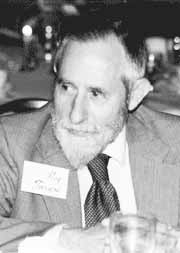On this date in 1910, Roy Torcaso, a leader in the church-state separation movement, was born in Enumclaw, Wash. Torcaso, an atheist, filed his Supreme Court-bound lawsuit in 1959 when his application to be a Maryland notary public was denied on grounds that he refused to say he believed in God. This was a requirement to hold public office in many states, including the state of Maryland. “The point at issue is not whether I believe in a supreme being, but whether the state has a right to inquire into my beliefs.” (Washington Post, June 21, 2007.)
His case, Torcaso v. Watkins, eventually came before the Supreme Court, which in 1961 ruled unanimously in Torcaso’s favor and said Maryland’s requirements for public office violated the First and Fourteenth Amendments and Article 6. The Constitution’s Article 6 states, “No religious test shall ever be required as a qualification to any Office or public trust under the United States.”
Torcaso continued to be an advocate in the humanist movement. He was a board member of the American Humanist Association and a member of the Freedom From Religion Foundation’s Executive Council. He was featured in FFRF’s documentary “Champions of the First Amendment.” He also officiated secular weddings.
A veteran of World War II and the Korean War, Torcaso was a bookkeeper up until the time of his well-publicized trial. He lost his bookkeeping job during the trial because his employer, a Bethesda construction company, did not want to be associated with him and his beliefs. This led to financial difficulty for the Torcaso family, but he continued to fight for his rights even when his children were ostracized by some of their neighbors.
Torcaso fought for racial integration of his neighborhood, attended pro-choice rallies, and supported the right-to-die movement. Torcaso had three children and was married for 60 years. His case inspired his daughter, Linda Bernstein, to become a lawyer. “He was an activist to the end of his life. He just did not believe that religion should enforce its views on the whole of society,” Bernstein said in a June 2011 interview with Americans United for Separation of Church and State. (D. 2006)


